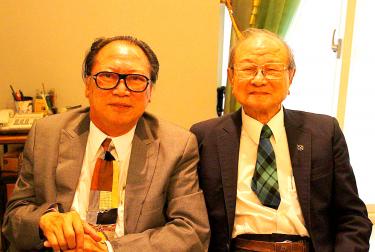Prominent Taiwanese composer Tyzen Hsiao (蕭泰然) passed away at his residence in Los Angeles, California, on Tuesday morning at the age of 77 from multiple organ failure after battling lung cancer for two years.
Hsiao’s son, Joseph Hsiao (蕭傑仁), yesterday confirmed the news on Facebook, saying: “My father, is now in heaven today as of 9:10am. No more pain and suffering.”
The post also called on the public and media not to disturb him with calls, as he still needed time to grieve.
Known as “Taiwan’s Rachmaninoff,” after legendary Russian composer and pianist Sergei Rachmaninov, Tyzen Hsiao was born in Kaohsiung on Jan. 1, 1938.
He studied music at National Taiwan Normal University and Musashino Academia Musicae before relocating to the US in 1977.
Tyzen Hsiao was known primarily for his efforts to “use the spirit of Taiwanese folk melody as the core and meld it into the classical, romantic, impressionistic and modern styles of music to form the basis for the neo-Taiwanese music style.”
His works include three concertos, composed from 1988 to 1990: 1947 Overture (一九四七序曲), composed in memory of the 228 Incident; Love Taiwan (嘸通嫌台灣), a piece which many believe caused Tyzen Hsiao to be blacklisted by the Chinese Nationalist Party (KMT) government; and Formosan Angels (福爾摩莎的天使).
The 228 Incident refers to an uprising that began on Feb. 27, 1947, against the authoritarian KMT regime of the time and the resulting brutal crackdown that left tens of thousands dead and led to nearly four decades of martial law.
Despite being diagnosed with lung cancer after a visit to Taiwan in 2012, Tyzen Hsiao nonetheless made several appearances last year at multiple concerts held in his name in the US, and helped the Taiwan Center Foundation of Greater Los Angeles raise funds for their events.
Many of Tyzen Hsiao’s friends in Los Angeles said they were sad to hear the news of his passing.
The Shepherds of the Valley Presbyterian Church in Hacienda Heights, Los Angeles, also said it would hold a memorial service for him on March 14.
Minister of Culture Hung Meng-chi (洪孟啟) expressed his sadness upon hearing of Tyzen Hsiao’s passing, and said the ministry was already in the process of applying for an official commendation for him.
Tyzen Hsiao completed nearly 100 compositions, including concertos and symphonies, and his influence would continue to resonate among music lovers for years, Hung said.
Democratic Progressive Party Chairperson Tsai Ing-wen (蔡英文) posted on Facebook her sadness at hearing of the composer’s passing.
His works will become an asset that all Taiwanese will have in common, Tsai wrote, adding that it was also due to his efforts that many folk melodies in the nation had become popular overseas.
“Taiwan is not absent on the ethnic musical map; may he rest in peace,” Tsai wrote.
Taipei Department of Information and Tourism Commissioner Chien Yu-yen (簡余晏) said the nation needed a song to “help us coalesce our mutual historical memories,” after posting a recording of Taiwan the Green (台灣翠青), which is regarded by Taiwan independence supporters as a candidate for the national anthem.
Taiwan the Green is a poem written by the John Jyigiokk (鄭兒玉), a Taiwan Presbyterian Church pastor and professor at Tainan Theological College and Seminary. Tyzen Hsiao set to music in 1988.
Source: Taipei Times - 2015/02/26





















